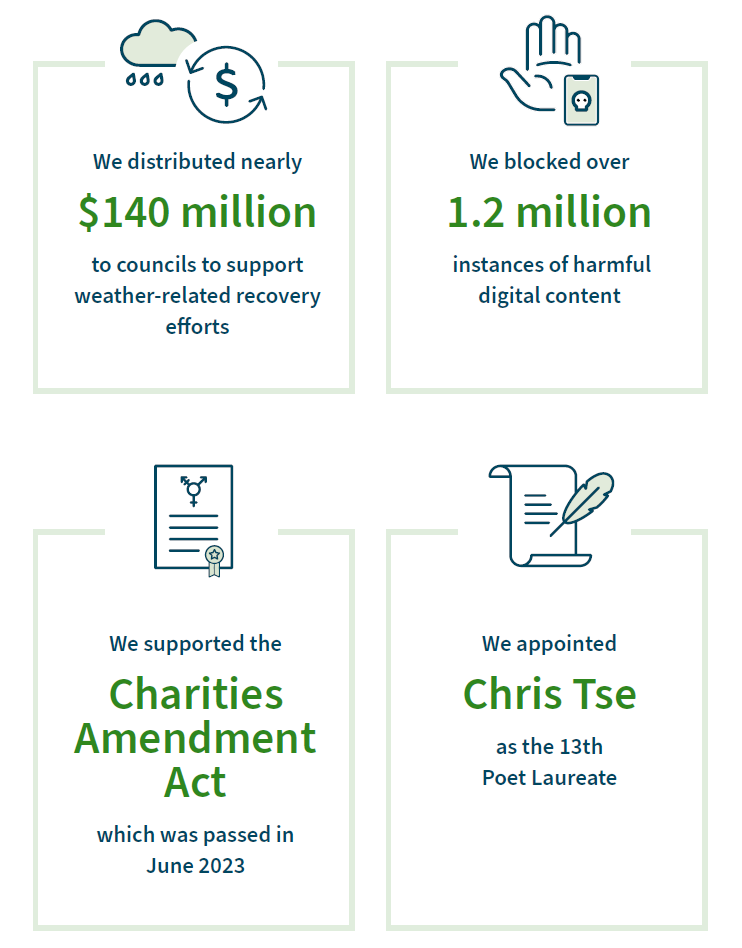- Pūrongo ā-Tau 2022-23
- SECTION 1
Our year in review - SECTION 2
Making New Zealand better for New Zealanders - SECTION 3
A high-performing organisation and a great place to work - SECTION 4
Māori-Crown Relations Capability - SECTION 5
Carbon Neutral Government Programme - SECTION 6
Annual Report of the Ministry for Ethnic Communities - SECTION 7
Digital Executive Board Annual Report 2022/23 - SECTION 8
Financial and non-financial results - SECTION 9
Appendices - SECTION 10
Glossary (Appendix E)
- SECTION 1
Go to the Contents View or download the PDF version Go to the next section
1. He tirohanga arotake ki te tau kua hipa
Our year in review
In this section:
He kupu nā te Tumu Whakarae
Secretary for Internal Affairs’ foreword
Te āhua me te momo o ā mātau mahi
Nature and scope of our functions
He kupu nā te Tumu Whakarae
Secretary for Internal Affairs’ foreword
Kia ora koutou
Hei tīmatanga kōrero māku
Whāia te hīnātore o te mauri atua hei oranga mo te mauri tāngata.
Ko te whakaruruhau o te kōrero tēnei i whai mana, whai hua i ā mātou mahi i mahia i te tau kua hipa.
Hui te ora, hui te mārama.
Haumi e, hui e, tāiki e.
Te Tari Taiwhenua Department of Internal Affairs touches the lives of all New Zealanders, whether it is by registering a birth, recognising citizenship, taking care of our country’s most important documents and records, leading the water services reforms, managing official visits and ceremonies, or regulating gambling.
Our mahi is delivered by a team of dedicated public servants, and over the past 12 months, we have continued to face challenges through the latter stages of COVID-19, adverse weather events and a surge of demand for passports. Our people have risen to these challenges while ensuring our business as usual responsibilities are met.
One of our responsibilities is to work with and through public sector agencies to drive and deliver customer-centred digital government.
We are responsible for the Cloud First Policy, which helps guide the technology choices government agencies make. In April 2023, Cabinet updated the policy to recognise how technology and society has changed. This includes a world first for including indigenous considerations in a national Cloud policy. It also acknowledges sustainability and the new significant onshore investment in Cloud capability. Public sector agencies spent $900 million on digital through commercial arrangements we have in place to aggregate buying power.
Over the past year, we helped deliver the Digital Identity Services Trust Framework Bill. When the Bill comes into effect, it will create rules and regulatory oversight to help people and businesses prove who they are in a secure and efficient way so they can access services, transact, and generally live and work in a digital world.
Digital was also the topic of our first Long-term Insights Briefing, which explored how community participation and decision-making can be better enabled by technology. Communities we spoke to described a future where their participation could be authentic, inclusive, community-led and enabled by technology, not driven by it.
A key responsibility for us is obligations under Te Tiriti o Waitangi. We established Te Urungi, a new Māori, Strategy and Performance branch to increase our capability to work with and for Māori, and help achieve our goal that oranga hapū, iwi and Māori is improved through enduring, equitable and positive Māori-Crown partnerships.
We continued working in partnership with iwi to explore how our programme to introduce a new civil registration system (also known as births, deaths and marriages) could provide opportunities to improve access to iwi affiliation information for whānau and iwi Māori.
In April 2023, the Government announced changes to water services reforms. We continue to work constructively with council officers, iwi collectives, communities and other organisations to ensure New Zealanders have safe drinking water and that stormwater and wastewater are properly managed.
On behalf of the Lottery Grants Board, we trialled a more responsive and accessible way of providing funding called Funding for Change. It enables hapū, iwi and communities to access smaller amounts of funding when they need it – rather than waiting for a specific annual funding round.
When the country was hit by adverse weather events in early 2023, we supported local government by working on legislative changes to make it easier for councils to focus on recovery work, and distributed nearly $140 million to them to support recovery efforts. The National Library worked with other agencies to provide advice on rescuing and preserving community and personal taonga in devastated areas.
The mahi covered in this annual report has a consistent theme: we remain a safe pair of hands. This year, we have taken on new responsibilities, including establishing a new Royal Commission of Inquiry into COVID-19 Lessons Learned, preparing to establish the Independent Conduct Complaints Authority for Fire and Emergency New Zealand, and a regulatory system to operate the new Digital Identity Services Trust framework.
I would like to thank the Te Tari Taiwhenua team for their tireless work over the past 12 months. Thanks to you, we are a high-performing organisation and a great place to work.
Included in this annual report is reporting for the Ministry for Ethnic Communities and the Digital Executive Board, which are included in Vote Internal Affairs.
Ngā mihi nui

Paul James
Te Tumu Whakarae mō te Tari Taiwhenua
Secretary for Internal Affairs
Ngā tīpako
Highlights

|
Te āhua me te momo o ā mātau mahi
Nature and scope of our functions
Tō Tātou Whāinga – Our purpose
Ko tā Te Tari Taiwhenua he whakarato me te hono i ngā iwi, ngā hapori me te kāwanatanga ki te hanga motu haumaru, tōnui, whai mana hoki.
Te Tari Taiwhenua Department of Internal Affairs serves and connects people, communities and government to build a safe, prosperous, respected nation.
Our purpose remains consistent, even as the functions and services we perform evolve to meet the changing needs and expectations of New Zealanders and the Government.
We work with people, communities, and government – both central and local – to make New Zealand better for New Zealanders.
Our Ministerial Portfolios
We are responsible to five Ministers, administering six portfolios within Vote Internal Affairs. In addition, the Ministry for Ethnic Communities, a departmental agency hosted by Te Tari Taiwhenua, administers one portfolio and is responsible to one Minister.
The Minister of Internal Affairs is the Vote Minister and the responsible Minister overseeing the Government’s ownership interests in Internal Affairs. The portfolios and responsible Ministers as at 30 June 2023 were:
|
Te Tari Taiwhenua |
|
|
Internal Affairs |
Hon Barbara Edmonds |
|
Community and Voluntary Sector |
Hon Priyanca Radhakrishnan |
|
Digital Economy and Communications |
Hon Ginny Andersen |
|
Local Government |
Hon Kieran McAnulty |
|
Ministerial Services |
Rt Hon Chris Hipkins |
|
Racing |
Hon Kieran McAnulty |
|
|
|
|
Diversity, Inclusion and Ethnic Communities |
Hon Priyanca Radhakrishnan |
We have a broad range of responsibilities and functions that include working with communities, ensuring effective regulatory frameworks are in place, and supporting the Executive and local government. Our role is also to invest in information and communications technologies and information management, and deliver a range of services to support and foster New Zealand’s cultural identity.
Our wider functions
Our wider functions include:
- Managing and protecting the integrity of national identity information. This includes life events such as births, deaths, marriages, citizenship and issuing passports.
- Regulating activities in several sectors including: gambling, online child exploitation, and countering violent extremism. We also regulate government recordkeeping, charities, unsolicited electronic messages, anti-money laundering, private security personnel and private investigators.
- Providing policy advice to Government on: local government, the community and voluntary sector, fire and emergency services, identity, information and communications technology (ICT), information management, digital safety, gambling, and racing.
- Providing information, resources and advice to communities to support their aspirations.
- Administering grant funding schemes as well as promoting trust and confidence in the charitable sector.
- Supporting Ministers to ensure Executive Government operates efficiently and effectively. This includes providing ‘Very Important Person’ (VIP) transport services for members of the Executive Government and other VIPs and dignitaries.
- Coordinating and managing official Guest of Government visits to New Zealand, and arranging national commemorative events.
- Advising on, establishing and supporting the operation of public and Government inquiries and reviews, including Royal Commissions of Inquiry.
- Administering a range of statutory functions for the Minister of Local Government, including for Lake Taupō and offshore islands.
- Leadership in the direction and operational approach for digital across the core public service.
Our responsibilities
Te Tari Taiwhenua has administrative responsibility for approximately 50 Acts (plus an additional 62 historic Local Legislation Acts) and about 120 pieces of secondary legislation. We also have functional regulatory roles or share responsibility under six other pieces of legislation.
We monitor the performance of three Crown entities (Fire and Emergency New Zealand, the Office of Film and Literature Classification and Taumata Arowai). We also manage the appointment process for members of a range of trusts, committees and boards.
We support our public sector colleagues to transform their services through better investment in ICT and to maintain the privacy of New Zealanders’ government- held information. Our system leadership roles of Government Chief Digital Officer and the Government Chief Privacy Officer, lead the digital transformation of government across the public sector. We also play a system leadership role for local government. We link central and local government more effectively to achieve improved outcomes for citizens and communities.
Te Tari Taiwhenua is responsible for the National Library of New Zealand Te Puna Mātauranga o Aotearoa and Archives New Zealand Te Rua Mahara o te Kāwanatanga. Both play an important role in preserving New Zealand’s documentary heritage and ensuring a full and accurate public record is created and maintained. In particular:
- The Chief Archivist has a system leadership and regulatory role in administering the Public Records Act 2005, which establishes the statutory framework for information and records management across the public sector to:
- Enable the government to be held accountable by ensuring that full and accurate records of central and local government are created and maintained
- Preserve and manage, and provide access to, records of long-term value
- Enhance public confidence in the integrity of public and local authority records.
- The National Librarian has a system leadership role in the preservation, protection, development, and accessibility of New Zealand’s documentary heritage. This involves:
- Collecting, preserving, and protecting documents, particularly those relating to New Zealand, and making them accessible for all the people of New Zealand, as they are documentary heritage and taonga
- Supplementing and furthering the work of other libraries in New Zealand
- Working collaboratively with other institutions that have a similar purpose, including those that are part of the international library community.

